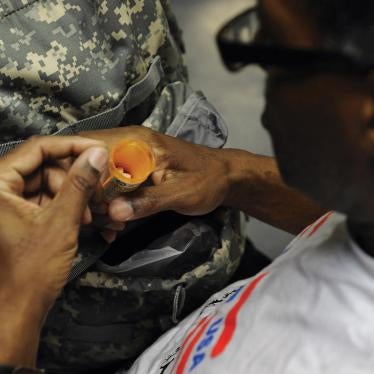We write to express our grave concern about your plan to introduce legislation that would make the federal penalties for methamphetamine offenses equal to those currently in place for crack-cocaine offenses. While we welcome your call for increased federal funding for treatment, it would be a mistake to impose penal sanctions for methamphetamine offenses which mirror those for crack cocaine.
The adverse social and health consequences of the sale and use of methamphetamine, and the public safety risks associated with manufacturing the drug, certainly warrant public concern. But federal mandatory minimum crack cocaine sentences have been widely and soundly criticized as excessive and disproportionate. Indeed, Human Rights Watch has testified before the United States Sentencing Commission that the disproportionality of current crack cocaine sentences renders them inconsistent with basic human rights standards. We also note that mandatory minimum sentences by their nature invite unjust sentences. We would be troubled by any legislation that would increase the number of crimes subject to such sentencing.
As you know, many federal judges, the United States Sentencing Commission, and numerous public interest and legal organizations oppose mandatory minimum sentences, particularly those which key sentences to just one or two factors such as the amount of drugs and a person's prior record. Mandatory minimum sentences deprive judges of the discretion they should have to consider all of the circumstances surrounding a person's involvement in the drug trade, including their role in the offense and their level of involvement. As data compiled by the United States Sentencing Commission shows, federal crack cocaine sentences have resulted in countless cases of shockingly harsh penalties for low-level, non-violent offenders.
We recognize the public interest in curtailing the production of methamphetamine, particularly because it is uniquely dangerous. We also recognize the public interest in curtailing the sale and use of methamphetamine. But these public goals do not justify penal sanctions that are disproportionately harsh and that violate basic principles of criminal justice and internationally affirmed human rights.
For too long, the nation has responded to the seemingly intractable problem of illegal drug use with increased prison sentences. We understand the rising groundswell of public sentiment that "something must be done about methamphetamine," but we do not think the response should be more mandatory minimum sentences, much less ones that are excessively severe. Indeed, we urge you to support efforts to rethink the nation's over-reliance on imprisonment as the principle response to drug offenses at the expense of alternatives to incarceration and more access to treatment.
You have said that you want to avoid the mistakes that were made in the 1980s when the government failed to quickly and adequately respond to the crack epidemic. You would help the nation avoid repeating the worst of those mistakes if you encourage an approach to methamphetamine (as well as other illicit drugs) that seeks to reduce the worst harms of illicit drugs—the havoc it wreaks on the lives of people who use, their families, and their communities. Long incarceration sentences do little to reduce the demand for drugs, and have had scant impact on their supply in the United States. It is long past time for the United States to rethink its basic strategies in this "war against drugs."
We would welcome the opportunity to discuss with you our views on your proposal to address the increase in methamphetamine production, sale, and use. In the meantime, we encourage and strongly support your efforts to increase the availability of treatment for those who use methamphetamine.
Sincerely,
/s
Jamie Fellner, Esq.
Director, U.S. Program






